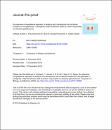An extensive computational approach to analyze and characterize the functional mutations in the galactose-1-phosphate uridyl transferase (GALT) protein responsible for classical galactosemia

View/
Publisher version (Check access options)
Check access options
Date
2019-12-13Metadata
Show full item recordAbstract
Type I galactosemia is a very rare autosomal recessive genetic metabolic disorder that occurs because of the mutations present in the galactose-1-phosphate uridyl transferase (GALT) gene, resulting in a deficiency of the GALT enzyme. The action of the GALT enzyme is to convert galactose-1-phosphate and uridine diphosphate glucose into glucose-1-phosphate (G1P) and uridine diphosphate-galactose, a crucial second step of the Leloir pathway. A missense mutation in the GALT enzyme leads to variable galactosemia's clinical presentations, ranging from mild to severe. Our study aimed to employ a comprehensive computational pipeline to analyze the most prevalent missense mutations (p.S135L, p.K285 N, p.Q188R, and p.N314D) responsible for galactosemia; these genes could serve as potential targets for chaperone therapy. We analyzed the four mutations through different computational analyses, including amino acid conservation, in silico pathogenicity and stability predictions, and macromolecular simulations (MMS) at 50 ns The stability and pathogenicity predictors showed that the p.Q188R and p.S135L mutants are the most pathogenic and destabilizing. In agreement with these results, MMS analysis demonstrated that the p.Q188R and p.S135L mutants possess higher deviation patterns, reduced compactness, and intramolecular H-bonds of the protein. This could be due to the physicochemical modifications that occurred in the mutants p.S135L and p.Q188R compared to the native. Evolutionary conservation analysis revealed that the most prevalent mutations positions were conserved among different species except N314. The proposed research study is intended to provide a basis for the therapeutic development of drugs and future treatment of classical galactosemia and possibly other genetic diseases using chaperone therapy.
Collections
- Biomedical Sciences [846 items ]


